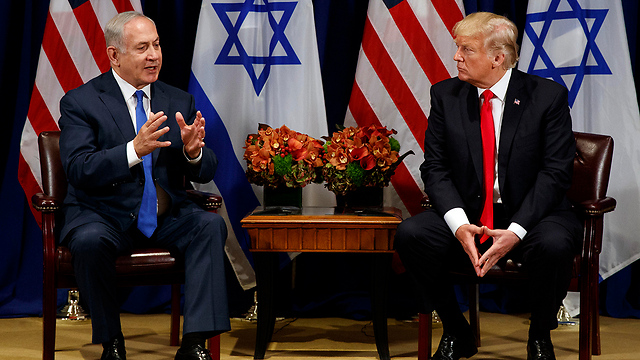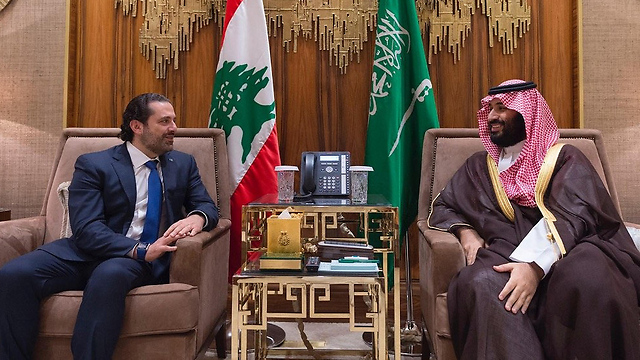Analysis: The IDF chief of staff’s rare interview to a Saudi news website strengthens and confirms Saudi Arabia’s claims against Iran. Israel’s interests are both security-related and diplomatic and have to do with the Saudi involvement in the Trump administration’s Mideast peace initiative.
Elaph reporter Majdi Halabi asked to interview the chief of staff more than a week ago, but Eisenkot accepted the request only several days later, after consulting with Prime Minister Benjamin Netanyahu and under his order. The timing of the interview was basically determined by the prime minister, while the content was determined by the chief of staff. What are the prime minister, chief of staff and defense minister trying to achieve through this interview with the Saudi news website?
Part of the answer can be found in the fact that Saudi Crown Prince Mohammad bin Salman is in a state of distress. He is subject to criticism within the Saudi royal family and among Saudi clerics, and his aggressive move against Iran—a conscious and military move—is at its midst and is raising eyebrows in the international community.
Valuable support for Saudi claims
The things the chief of staff told the Saudi website strengthen and confirm the Saudi royal family’s claims against Iran. The IDF Intelligence Directorate, and Israel’s intelligence community in general, are recognized and accepted in the Middle East and in the entire world as an authority on the Middle East in general and on Iran in particular. But when the Israeli chief of staff, who is considered a professional rather than a politician, specifies each of Iran’s intentions and the steps it is taking to gain regional hegemony, it’s a move that provides valuable support for Saudi Arabia’s claims.
There is also a great similarity between what Lebanese Prime Minister Saad al-Hariri said in his resignation speech in Riyadh and the intelligence analysis provided by the IDF chief in the Elaph interview. The chief of staff’s interview on Lebanon indicates that an authorized Israeli source supports Saudi Arabia’s claims not only against Iran in general, but specifically against Hezbollah.
Saudi Crown Prince Mohammad bin Salman (R) with resigning Lebanese Prime Minister Saad al-Hariri (Photo: Reuters) (Photo: Reuters)
Furthermore, when an IDF chief explicitly addresses the threat Hezbollah poses to the Arab world, it is seen as a sort of implicit threat. Eisenkot didn’t threaten Hezbollah with war, like the Saudi crown prince might have wanted him to do. On the contrary, he said Israel wasn’t interested in war with Lebanon or Syria. But the specification of the information Israel has on Iran, Hezbollah and their activities in Syria, Lebanon and Yemen serves as a very helpful hint for the Saudis in general, and for bin Salman in particular, in their efforts to enlist the Arab and American public opinion.
How does Israel benefit from Eisenkot’s interview? The main thing Israel stands to gain is tighter unofficial relations with Saudi Arabia. Crown Prince bin Salman basically owes Israel and the IDF chief for their swift help in confirming his claims against Iran and Hezbollah, and for the indirect aid they are offering him in his relations with US President Trump and with the Europeans concerning the Middle East.
But even more important is apparently the diplomatic benefit Prime Minister Benjamin Netanyahu would like to gain from the interview. President Trump is planning to present his plan or outline for an agreement between Israel and the Palestinians in about a month. This agreement will essentially be an American-Saudi initiative, largely based on the Saudi peace plan.
Netanyahu and the current government are unwilling to accept the 2002 Saudi peace plan as it is, even after the small amendments that have been made to it, which is why Israel needs the Saudis to soften their plan and their demands regarding the Palestinians that they are presenting to the Americans. Netanyahu decided, therefore, to let the chief of staff give the interview at this time, while the Trump administration’s plan to solve the conflict with the Palestinian is in its last stages of configuration.
 Prime Minister Benjamin Netanyahu (L) and US President Donald Trump. A Saudi-American initiative for an Israeli-Palestinian agreement (Photo: AP) (Photo: AP)
Prime Minister Benjamin Netanyahu (L) and US President Donald Trump. A Saudi-American initiative for an Israeli-Palestinian agreement (Photo: AP) (Photo: AP)
Netanyahu hopes that a gesture towards the bin Salman, who is about to succeed his father and be appointed king, will be answered with a gesture from the 32-year-old crown prince concerning an agreement with the Palestinians. Netanyahu doesn’t know what Trump’s initiative will include, but he does know that Saudi Arabia will play a significant part in it.
The chief of staff’s interview serves as an important leverage to enlist the Saudis’ goodwill and influence on Trump. The Saudis, by the way, have been constantly active on this issue, which is why they invited Palestinian President Mahmoud Abbas to Saudi Arabia last week for talks aimed at softening his stance. Trump’s son-in-law, Jared Kushner, and the White House official in charge of the Israeli-Palestinian issue have also visited Riyadh several times recently.
All this proves that the Saudi royal family and the crown prince are deeply involved in forming the American initiative. Netanyahu, who isn’t aware of the exact nature of this initiative, is concerned by it because it may put his government’s survival to the test. This is the important context in which Eisenkot’s interview must be examined and understood.



